Iranian Journalists Face Escalating Repression
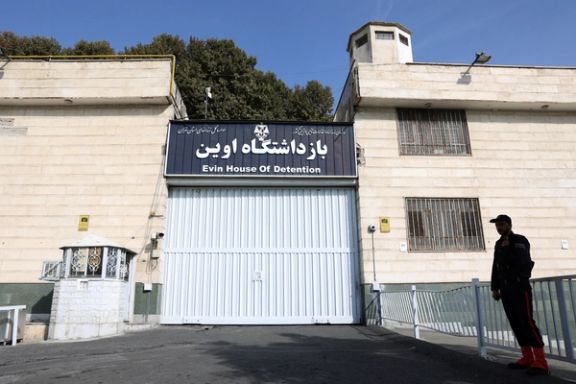
Two reporters have been summoned to Evin jail in Tehran to serve sentences for their reporting during the 2022 Women, Life, Freedom protests.

Two reporters have been summoned to Evin jail in Tehran to serve sentences for their reporting during the 2022 Women, Life, Freedom protests.
They are required to appear in Branch One of the Evin Courthouse tomorrow to receive sentences of three years and six months in jail.
The charges include “conspiracy against the system”, “engaging in anti-establishment propaganda activities.” These vague charges are routinely applied not only to protesters, but critics or artists, writers and journalists who make statements contrary to regime’s agenda.
They also face two years of travel ban, and two years of prohibition from joining groups and political parties.
Zeinab Rahimi, an environmental journalist, has also revealed that a case has been initiated against her. The charges include "spreading lies and harming public chastity." Accompanied by her lawyer, Rahimi appeared in the Culture and Media Courthouse on Sunday. After being informed of the charges, she was released on bail pending the final verdict.
Mahnaz Moazen, a journalist and translator, is also still in custody and facing uncertainty five days after her arrest. Moazen was apprehended on Thursday by security forces and transferred to an undisclosed location.
Economic reporter Maryam Shokrani took to social media on Saturday, stating, "A new case has been filed against me in Branch 16 of the Culture and Media Courthouse in Tehran. I don't even know the subject of the complaint."
The International Federation of Journalists reports that during the uprising against the Islamic Republic which began last September, at least 100 journalists in Iran have been detained, with over 21 of them receiving sentences totaling 77 years in prison.
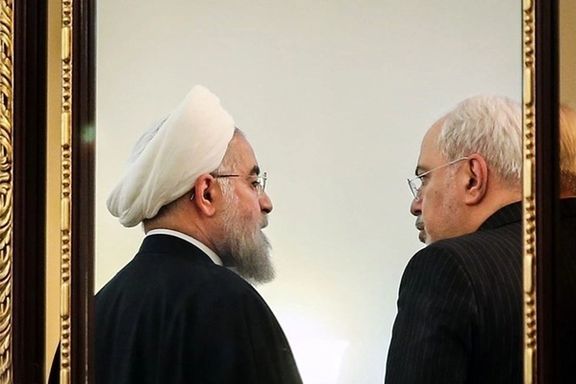
Iran's former foreign minister joined ex-president Hassan Rouhani to warn against Iran becoming involved in the Israel-Hamas war in Gaza.
Mohammad-Javad Zarif said the entry of Iran and Hezbollah into the ongoing conflict between Hamas and Israel only serves the interests of the Israeli government. “Israel is trying to drag the war outside its borders and involve the United States,” he added.
Zarif also highlighted Russia's historical alignment with Israel, noting that the Soviet Union was the first country to recognize Israel. He pointed out that two million Russian citizens currently reside in Israel. While acknowledging that the policies of Russia and China are relatively more balanced compared to the United States and Europe, Zarif stressed that neither Russia nor China supports the Palestinians.
Without going into details, Zarif revealed that a hardline group has in a letter to Supreme Leader Ali Khamenei pushed for dragging Iran into the war.
On Thursday, Hassan Rouhani, the ex-president of Iran, addressed the ongoing conflict in Gaza, warning that the regime's flaming of unrest is putting Iran at risk.
He emphasized the potential consequences of its being overly involved, directly or indirectly through its proxies, warning that "a mistake, a wrong decision, or an imprecise action could drag the flames of war towards us."
Growing concerns about the potential escalation of the Israel-Hamas conflict throughout the Middle East have prompted the United States to deploy additional air defenses, warships, and fighter aircraft to the region since Iran-backed Hamas invaded Israel on October 7. The deployment includes two aircraft carriers and involves the addition of thousands of troops.
Thousands of Hamas troops invaded Israel by air, land and sea, killing at least 1,200 mostly civilians and taking around 240 hostage. It has seen a relentless retaliation from Israel which has troops the deepest into Gaza since Hamas took over the strip in 2007, with airstrikes killing thousands in the densely populated coastal enclave.
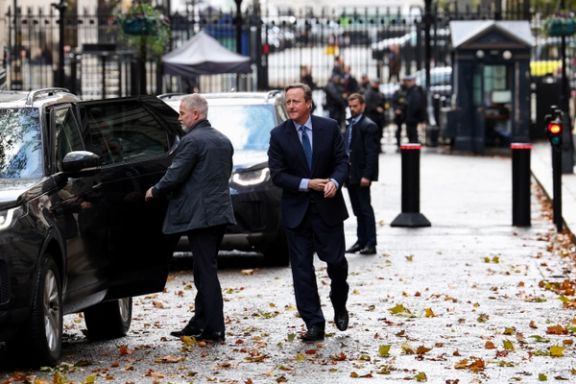
In a shock cabinet reshuffle, former PM David Cameron has been brought back into politics as the Conservative party's foreign secretary.
It came following the firing of home secretary Suella Braverman, as she was the most outspoken member of government to critizing the police for its handling of pro-Hamas protests in the UK’s streets.
The protests, partly supported by Iran, had brought hundreds of thousands of people to the UK’s streets, including across the British capital, leading to a wave of antisemitism and Islamist manifestations in Britain.
In a shock move, she has been replaced by foreign minister James Cleverly, with the role of foreign minister going to former PM David Cameron, who stepped down after the Brexit referendum in which the UK voted to leave the European Union.
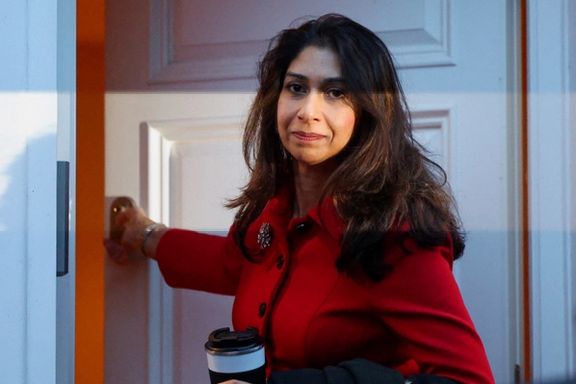
It was Cameron who during his time as the British PM between 2010-2016, reinstated relations with Iran. He met with President Hassan Rouhani at the UN headquarters in New York in 2014 in the first such meeting since the Iranian Revolution in 1979.
He was charged with reopening diplomatic ties which had been cut after Iranian regime loyalists stormed the British embassy in Tehran in 2011.
In 2013, the election of what appeared to be a more moderate Rouhani, replacing Mahmoud Ahmadinejad, paved the way for a thaw in ties. In 2014, the UK reopened its embassy.
The 2014 meeting focused on nuclear talks but also addressed the rising threat of the Islamic State group, which at the time had taken over much of Syria and Iraq.
A statement from the PM’s office at the time offered signs of progress, and said: “The PM and president acknowledged that there had been significant differences between their countries in the past, and agreed that we should seek to progressively improve our bilateral relationship.”
But almost a decade later, little has changed with Iran remaining one of the world's largest funders of terror. The PM office at the time had stated: “The prime minister and president noted the threat posed to the whole region by ISIS, and agreed that all states in the region must do more to cut off support for all terrorist groups, including financial support.”
Since then, in addition to being a state sponsor of terror, Iran has been declared by the UK as one of its biggest domestic threats with numerous foiled attacks on British soil in the last year. This includes MI5 admitting it could no longer secure the offices of Iran International which had come under threats from Iranian state agents, forcing a temporary relocation to Washington.
Cameron has been out of politics for several years, penning his memoirs and delving into business, including Greensill Capital, a finance firm which later collapsed.
In 2015, Cameron felt the wrath of interfering in US politics when he attempted to lobby senators against a new bill imposing fresh sanctions on the Iranian regime. At the time, one Republican told The Telegraph that the prime minister's intervention into American politics was "not a productive move”.
The prime minister had warned that even the threat of fresh sanctions could lead to the breakdown of the delicate nuclear negotiations going on in Geneva between Iran and a six-nation bloc that included Britain and the US.
In contrast, just weeks later, Israeli prime minister Benjamin Netanyahu was welcomed by Republicans when he came to Washington backing the US to be more hawkish on Iran policy.
Cameron's previous attempts to adopt a lenient approach toward Iran were consistent with the policies of then-US President Barack Obama. The Biden administration is now pursuing a similar course of action, but it is encountering criticism in the process.
In 2015, Mark Dubowitz, the head of the Foundation for the Defence of Democracies, a think tank that supports deadline-triggered sanctions against Iran, said Mr Cameron's intervention did not appear to have changed the argument on Capitol Hill. "Senators don’t seem to be persuaded by David Cameron, who they perceive to be even further to the Left than the Obama administration on Iran," he told The Telegraph.
A recent investigation in The Times found around a dozen regime-backed organizations working on British soil, showing a deep infiltration into UK society through the likes of religious, charitable and educational institutions.
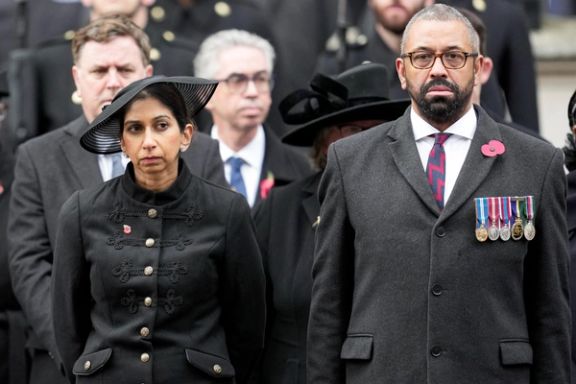
Just weeks ago, now Home Secretary James Cleverly was butting heads with his predecessor Suella Braverman over the contentious issue of designating the IRGC, like its ally, the US, which designated the group in 2019.
Speaking to the Jewish Chronicle in September, Cleverly said that “many of the things that people want” from proscription were “actually being achieved by our sanctions regime” that is already in place.
He added: “We will always keep our options open and we will always act in our country’s best interests.”
In September, Cleverly insisted that “any decision we make on proscription or sanctions is always done with the protection of British nationals and British interests at heart”.
Meanwhile, at least eight IRGC commanders have recently been offered the podium to give talks at British universities, pumping Islamic Republic rhetoric into the minds of young students.

Former US national security adviser John Bolton has called on President Joe Biden to be more forceful with Iran over its plots to kidnap or kill Americans.
Speaking to CBS Sunday, Bolton, who served under the Trump administration, told how the IRGC attempted to hire a hitman to kill him "either in the US or abroad.” He and others who had been serving at the time of the Trump-sanctioned assassination of Qods Force commander Qassem Soleimani, were all named as targets following the killing in 2020.
“This was not internet chatter. This was a negotiation to murder an American citizen, a former government official,” he said. “We have lost deterrence. And I think this also goes to an unwillingness on the part of the administration to confront the ayatollahs in a way that they understand," he said.
The plot against Bolton was foiled when the assassin hired turned out to be an FBI informant. According to court documents, an Iranian citizen by the name of Shahram Poursafi tried to arrange the murder of Trump’s National Security Advisor, “likely in retaliation for the January 2020 death of Qods (Quds) Force commander Qasem Soleimani.”
In the CBS interview on Sunday, Bolton told of the ongoing threat, which means he lives with “marked Secret Service cars that say, Police. United States Secret Service, outside my home".
Several other US officials have been under round-the-clock protection because of similar threats to their life from the regime in Iran, including former Defense Secretary Mark Esper and former Secretary of State Mike Pompeo, according to CBS.
“I think the targeting of American citizens by a hostile foreign government is very close to an act of war,” Bolton said in his interview. “The Biden administration needs to be doing more to keep Iran in check.”
The Islamic Republic has a history of abduction and assassination as key parts of its foreign policy, mostly against Iranian dissidents in exile. Jamshid Sharmahd and Masih Alinejad are two recent examples discussed in CBS’ flagship program, 60 Minutes.
Both American citizens, the former was kidnapped in Dubai in 2020 and is now on death row in Tehran. The latter has been under protection since last year when the FBI foiled a plot to kidnap her from the US and take her to Venezuela.
Iran International was also mentioned in the 60 Minutes report as one of the more recent targets of the Islamic Republic’s policy to intimidate, silence or eliminate dissenting voices.
The London-based broadcaster had to relocate to Washington DC earlier this year when threats against its journalists got so severe that the UK police advised it to stop operation.
According to Matt Jukes, head of Counter Terrorism Policing in Britain, they have foiled 15 Iranian kidnapping and assassination attempts since last year. “I have been involved in national security policing for over 20 years. What we've seen in the last 18 months is a real acceleration.”
Iranian officials openly speak of their “reach” when threatening Iranian dissidents abroad. They often mention Rouhollah Zam, an Iranian activist and journalist based in France, who was kidnapped in Iraq, taken to Iran, and executed in December 2020.
More recently, the Biden administration has come under fire from both sides of Congress, with allegations that its response to Iran-backed attacks on US facilities in the Middle East also lacks deterrence.
The Biden softly-softly approach has meant that in the last one month alone, amid the war in Gaza waged by Iran-backed Hamas, over 40 attacks have taken place on the US in Iraq and Syria. There have been just three retaliatory attacks.
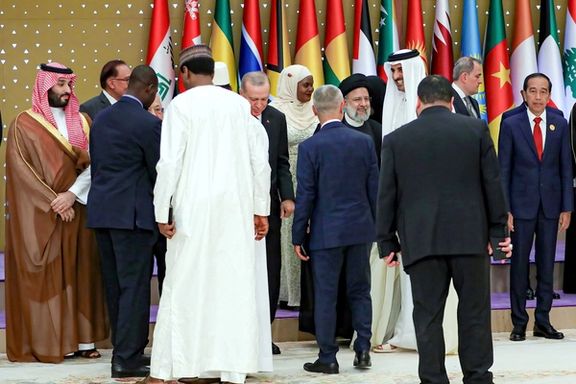
Iran's Foreign Ministry Spokesman claimed that Saturday's Islamic summit was a success due to “Iran's diplomatic efforts and Saudi Arabia's good cooperation.”
Nasser Kanaani said during a briefing on Monday that “The diplomatic efforts of Iran to mobilize the Arab and Islamic countries and draw the public's attention to the crimes of the Zionist regime have been successful.”
After closed-door negotiations in the Saudi capital, Riyadh, the summit concluded with a statement calling for a an immediate ceasefire, an arms embargo against Israel and condemning its aggression in Gaza. Despite this, no concrete plan of action was provided nor did the statement address Gaza's possible future scenarios.
Despite condemning Israel's actions in Gaza and demanding an end to the war, Arab and Muslim leaders' meetings highlighted their differing opinions.
Iran and Syria saw their efforts to impose punitive economic and political measures on Israel rejected by other Muslim states and excluded from the final resolution passed on Saturday.
Iranian calls for severing relations with Israel and declaring the Israeli army a "terrorist organization" were ignored as those Arab nations that have diplomatic relations with Israel pushed back, stressing the importance of maintaining open lines of communication with Netanyahu's government.
Since Hamas mounted a surprise ground and rocket attack on numerous Israeli targets on October 7th, killing about 1,200 Israelis, mostly civilians, there has been a massive retaliation against the enclave. Gaza officials say so far more than 11,000 residents have been killed, including children, a figure that cannot be independently verified.
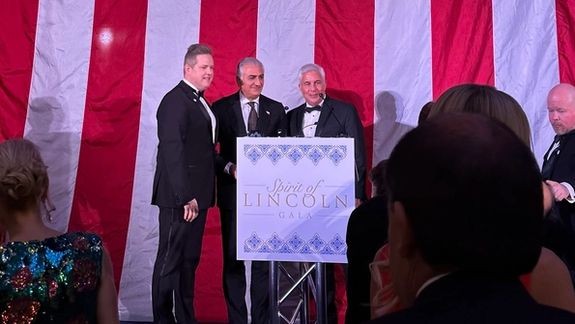
Exiled Iranian Prince Reza Pahlavi expressed his commitment to defending the rights of every Iranian, including those in the LGBTQ community.
The prince made the remarks after being honored with the Outspoken Award from the Log Cabin Republicans, an organization affiliated with the Republican Party dedicated to advocating for equal rights for LGBTQ+ Americans.
Pahlavi emphasized his pride in standing up for the rights of the Iranian LGBTQ community. He acknowledged the courage of his compatriots inside Iran, stating that “it is my brave compatriots inside Iran who truly deserve this honor because they are not only speaking out for their freedom. They are fighting for it. And they are not only fighting to free themselves; they are fighting to free the region and the world from the clutches of this regime and to usher in a new era of peace.”
The Log Cabin Republicans (LCR), known for promoting LGBTQ+ rights within the Republican Party, presented Prince Reza Pahlavi with the Outspoken Award on Sunday.
The Iranian LGBTQ community has played a pivotal role in the Women, Life, Freedom uprising, actively participating in both domestic and international protests. Despite facing the threat of execution and other forms of punishment under the laws of the Islamic Republic, LGBTQ individuals in Iran continue to bravely confront such dangers.
Iranian authorities have, in the past, employed derogatory labels and stigmatization when addressing LGBTQ citizens, referring to them as "deviant" and "sick" based on Islamic laws that prohibit same-sex relations.